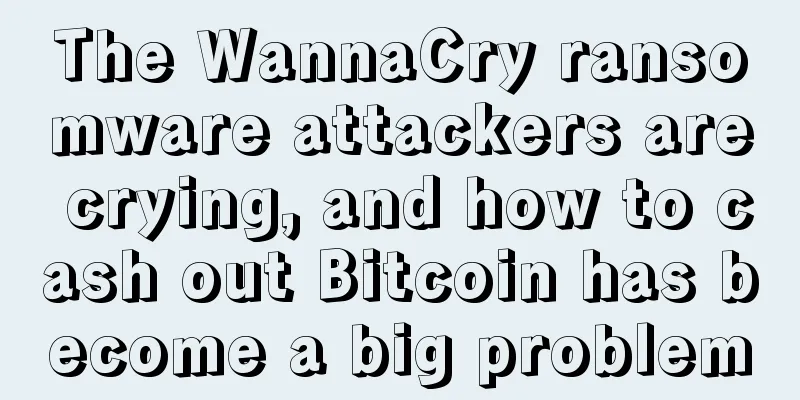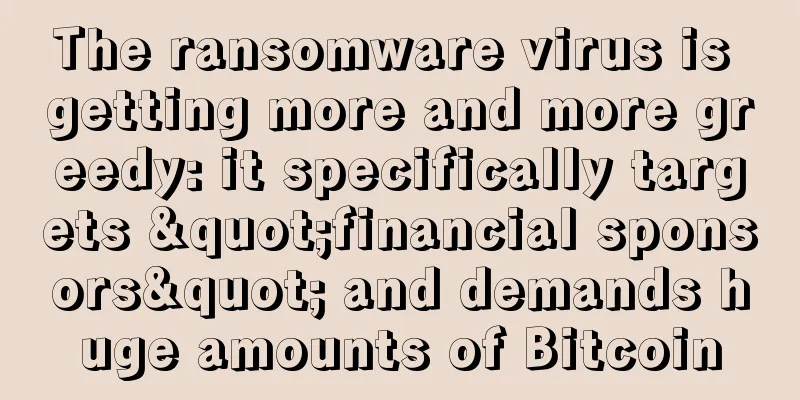The WannaCry ransomware attackers are crying, and how to cash out Bitcoin has become a big problem

|
The hackers behind the infamous WannaCry ransomware attack look set to make a killing this week, with the hackers receiving $80,000 worth of Bitcoin so far, but the next step may be more difficult: figuring out how to cash out the money without exposing their true identities. The well-publicized cyberattack, which began in Asia and has targeted hundreds of thousands of computers in more than 150 countries, encrypts data and files on computers once they are infected with the WannaCry virus, prompting users to pay $300 in Bitcoin to unlock the data. Shockingly, some people sent funds to three Bitcoin wallet addresses specified by the hackers, even though there is no clear evidence that victims who paid the ransom received the unlocking key. As cybercrime teams around the world keep a close eye on these Bitcoin addresses, the question will now be: Can hackers launder the coins and spend them, or are they tainted, so they are traceable, and therefore worthless to thieves? Keep an eye on these BitcoinsBitcoin was once touted as an anonymous payment tool, but compared to truly anonymous cryptocurrencies, Bitcoin can only be described as pseudo-anonymous. Bitcoin addresses, payments, and transactions are all transparent and traceable on the blockchain. By analyzing transaction patterns, it is possible to trace the flow of funds and the actual parties behind the public keys. WannaCry has become the most influential Bitcoin ransomware attack in history, and the criminals behind it have received a lot of attention. So if the hackers really want to spend the money they extorted, they need to find a smart way to delete all links to the original Bitcoin address. However, for now, hackers cannot use these bitcoins. Hide their tracksFor the hackers behind this ransomware attack, how can they launder these bitcoins? Cornell University professor Emin Gün Sirer said that laundering Bitcoin is different from laundering fiat currency, but it can be done with the right tools. According to him, the technology for laundering "tainted" Bitcoins already exists, they just need to master a little technical know-how. One of the simplest methods is “chain hopping,” which involves converting bitcoin into other digital currencies (usually on overseas exchanges).
Another solution is called "coin mixing", which mixes the hacker's Bitcoin with other people's coins multiple times. This kind of mixing service mixes bitcoins from different sources and then redistributes them. It is conceivable that hackers can repeatedly mix these bitcoins until the trackers are powerless. However, Ethan Heilman, a researcher at Boston University and a contributor to the TumbleBit project, pointed out that Bitcoin mixing is risky, especially when dealing with large amounts of money. As he pointed out, one of the problems hackers may encounter is that they need to find enough Bitcoin to fully mix with their stolen money.
Rookie mistake?It is worth noting that the hackers used only three Bitcoin addresses to collect the ransom money, which shows that they did not have much knowledge of Bitcoin privacy. If they assigned a Bitcoin address to each infected computer, the funds would be more difficult to track. Neil Walsh, the United Nations' global cybercrime chief, noted in a LinkedIn post that the shortcomings revealed in the ransomware attack could very well mean the hackers will reveal their true identities. He wrote:
However, as Sirer points out, the hacking industry is a layered ecosystem, and these attackers are likely looking for a coin launderer right now. Or, they may simply wait before trying to withdraw the funds. He concluded:
|
Recommend
Bitcoin mining POW is costly and wasteful, but it is fair
Is Bitcoin Proof of Work (POW) fair? Tomaso Aste ...
Complaining woman's face
Complaining woman's face Many women love to c...
How to tell a person's health status from the nine palm lines
Palmistry believes that the nine hills and the ma...
Do people with sunken cheekbones have bad luck? Is it good for a man to have round cheekbones in marriage?
Everyone hopes that their fortune will be good, b...
Learn astrology easily § Basic teaching ★ Western Astrology Hall ★
Mysterious Mesopotamia (Origin and Introduction o...
CQC public chain coin, popular on New Year's Day! Created by the original team of AOT, a mining machine will be given for real-name certification, and there is no fee for certification!
What is CQC public chain coin? How about the ever...
Does the face with ears close to the head mean that the career will be smooth and blessed?
Although the shapes of ears look similar, in fact...
A brief analysis of the blockchain policy in the Overall Plan for the Construction of Hainan Free Trade Port
The world today is undergoing a new round of grea...
Bitcoin rises above $6,000 to hit a record high of $10,000? Is this not a dream?
After a day or two of volatility, Bitcoin quickly...
From wine to lottery: Blockchain technology is about to take off
Imagine a world where you can vote in an election...
The face of a man who can accomplish great things
Since ancient times, men have been linked to care...
Is the marriage line accurate? It needs to be combined with other lines.
There are many lines on the human palm, which are...
Face analysis: What kind of forehead is good?
The Yin Tang belongs to physiognomy in metaphysic...
Venezuelan government tacitly approves Bitcoin development
Venezuela's economy is going through a very d...
Analysis of the facial features of women who will be loyal to their marriage and not cheat
It is rare to find someone who takes relationships...









